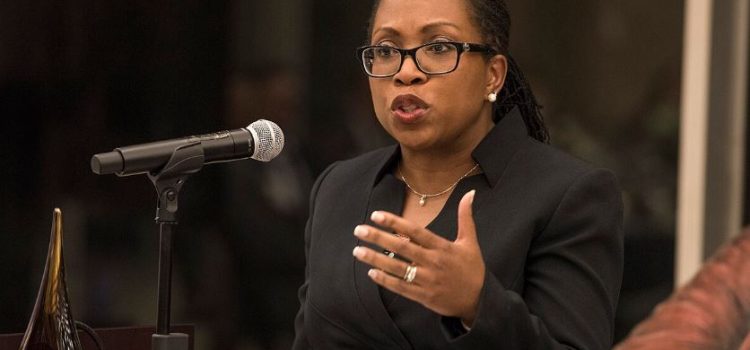
How did a young girl from Miami become the first Black woman to serve on the Supreme Court? What personal experiences shaped Justice Ketanji Brown Jackson’s approach to interpreting the law?
Ketanji Brown Jackson’s Lovely One: A Memoir traces her remarkable path from childhood to the nation’s highest court. The book reveals how family values, educational experiences, and professional challenges molded her judicial philosophy.
Read on to discover the key themes that defined Jackson’s extraordinary journey and continue to influence her work today.
Image source: Wikimedia Commons, cropped
Overview of Ketanji Brown Jackson’s Lovely One: A Memoir
Ketanji Brown Jackson’s Lovely One: A Memoir (2024) recounts the Supreme Court justice’s journey from a childhood in Miami to becoming the first Black woman appointed to the US Supreme Court. The book explores how she developed a strong sense of identity, navigated challenges through perseverance and community support, and formed a judicial philosophy that balances rigorous legal analysis with awareness of how the law (and its interpretation) affects people’s lives.
Jackson’s story also illustrates how the law has both constrained and expanded possibilities for Black Americans throughout the nation’s history. Written shortly after her appointment in 2022, it reveals how Jackson navigates this legacy and recognizes both the law’s power to oppress and its potential to fulfill America’s promise of equality. Through her experiences as a public defender, judge, and Supreme Court Justice, she offers a nuanced perspective on how legal institutions can better serve all Americans, particularly those from communities historically marginalized by those same institutions.
In this overview of the book Lovely One: A Memoir, we’ll explore Jackson’s narrative through four key themes underlying her success: the foundations of identity that gave her confidence and purpose, the combination of personal resilience and community support that helped her overcome challenges, her approach to law as both intellectually rigorous and deeply human, and her understanding of what it means to break barriers and create a meaningful legacy.
Who Is Ketanji Brown Jackson?
Jackson explains that her journey began with her childhood in Miami. Born in 1970 to Johnny and Ellery Brown—a school board attorney and a science teacher who later became a principal, respectively—Jackson was raised in a household where education, cultural pride, and self-belief were paramount. In this section, we’ll explore how her parents shaped her sense of identity and self-worth, preparing her for a world that would often question her presence and capabilities.
Building a Foundation of Pride and Purpose
Jackson says her parents understood that their daughter would navigate spaces not designed with her in mind, where her presence might be questioned or her capabilities doubted, because she was Black. By instilling pride in her heritage and conviction in her potential, they equipped her with the internal resources to withstand external pressures. This foundation enabled Jackson to maintain her authentic sense of self while adapting to environments ranging from elite academic institutions to prestigious legal circles.
One of the first gifts toward building this identity was her name. “Ketanji Onyika,” which means “Lovely One” in an African dialect, represented her parents’ desire to connect their daughter to her African heritage at a time when many Black Americans were reclaiming their cultural roots after generations of disconnection. Jackson explains that her name distinguished her in settings where she might otherwise have felt pressure to blend in. The naming choice also reflected the Browns’ approach to parenting: They surrounded their daughter with positive representations of Black achievement, including not only her name but also books, magazines, and educational experiences that countered negative stereotypes.
Rather than shielding her from America’s painful racial history, Jackson writes that her parents used their own family’s story to illustrate a narrative of resistance, resilience, and progress. For example, Jackson learned how her grandparents came of age in the segregated South, where Jim Crow laws denied Black Americans basic rights and opportunities. Her maternal grandfather, Horace, abandoned his chauffeur job in protest of the humiliating treatment he received from white customers. Her grandmothers worked as domestic help for white families, experiencing the inequalities of the era.
Despite these barriers, each generation of Jackson’s family pushed forward: Her parents became the first in their families to attend college, and her father decided to become a lawyer in his 30s, not just to improve his family’s financial situation but to engage more directly with the systems that shape American society. Through these family stories, Jackson says she came to understand herself as the embodiment of dreams deferred across generations. Her parents instilled in her the belief that, by law, Black people were entitled to share fully in the promises of America, even though she saw evidence of discrimination and inequality. This perspective gave her a sense of both responsibility and possibility that would guide her throughout her life.
Grit: A Family Value
Jackson says her parents didn’t just nurture her identity; they also taught her to persevere. They instilled in her what psychologists now call “grit”: the ability to persist in pursuing goals despite setbacks. If Jackson expressed frustration with a difficult task, her mother would ask her whether someone else had accomplished that task. If so, that proved that it was possible—and that she could do it, too. This message taught Jackson that abilities weren’t fixed but could be developed through persistent effort. Her father also modeled grit daily. After working all day, he would spread his law books across the kitchen table and study into the night, showing his daughter that obstacles yield to steady effort.
Education as the Gateway to Opportunity
Jackson emphasizes that her parents viewed education as the surest path to overcoming the barriers that Black Americans encounter. But as one of few Black students in her elementary school’s gifted program, she encountered both subtle and overt racial prejudice. For example, teachers disciplined Black students disproportionately and often struggled to pronounce her name. Jackson also recalls a painful childhood friendship with a white boy that ended abruptly when his mother decided she was “too different” to be his playmate, an early lesson on the social boundaries that would shape her journey.
These challenges followed her through high school, where she felt the sting of being followed by store clerks when shopping with friends and noticed she received few romantic invitations. Nevertheless, Jackson says, she thrived in high school—she excelled in speech and debate competitions and was elected student body president for three years running.
Jackson explains that her experiences with discrimination in school led her to develop what sociologist and civil rights activist W.E.B. DuBois called “double consciousness,” the experience of viewing oneself through the eyes of others. This awareness created a burden: Jackson felt she not only had to succeed for herself but also to counter negative stereotypes about Black intellectual capabilities.
Rather than allowing white people’s perceptions of her to diminish her self-confidence, Jackson developed a sense of self-worth grounded in her family’s belief in her potential. Her parents taught her that prejudice reflected the limitations of others, not her own value or capabilities. By the time she applied to college, Jackson had internalized this message so thoroughly that she wrote in her Harvard application essay about her aspiration to become the first Black female Supreme Court justice—a goal that seemed audacious at the time but would eventually become reality.
Jackson’s Journey From Harvard to the Supreme Court
Having explored how Jackson’s childhood shaped her strong foundation of identity, we now follow her path from college through her historic appointment to the Supreme Court. In this section, we’ll examine how she navigated educational and professional challenges, built supportive relationships, and balanced her ambitious career with family life.
Harvard Years: Finding Her Place and Her Partner
Despite her academic success in high school, Jackson confronted impostor syndrome when she arrived at Harvard in 1988. This psychological pattern—feeling like an intellectual fraud despite evidence of competence—was particularly intense for Jackson, as she was one of relatively few Black students in an environment dominated by privileged classmates whose families had attended elite universities for generations. The social and cultural transition proved more challenging than the academic workload itself, as she questioned whether she truly belonged in such rarefied surroundings.
A pivotal moment occurred during her freshman year when, feeling particularly doubtful about her place at Harvard, a Black woman she didn’t know passed her on a campus path and said just one word: “Persevere.” This brief interaction was transformative—the stranger’s recognition of her struggles provided the encouragement Jackson needed to push forward. The word became a personal mantra that would guide her through difficult periods throughout her education and career.
Jackson found her footing by engaging in campus life. She joined the Black Students Association, where she participated in protests against a student who displayed a Confederate flag from his dormitory window. She took courses in drama and performed improv comedy, while also studying government and taking classes that shaped her thinking, particularly Michael Sandel’s course on justice. Most importantly, she formed connections with other Black students, joining a study group that provided not only academic support but a space where she could fully be herself without feeling like an outlier because of her race. These relationships helped her maintain her authentic identity while learning to thrive in a predominantly white institution.
It was also during her undergraduate years that Jackson met Patrick Jackson, a white pre-med student who would eventually become her husband. Patrick came from a privileged Boston family with deep historical roots in New England, while Ketanji was the daughter of educators who had worked their way into the middle class—and the differences between their backgrounds initially gave her pause.
Jackson was concerned about how Patrick’s family might react to their relationship. Her parents, having grown up in the segregated South, were initially wary as well. But Patrick emphasized his commitment to choosing her even as she expressed these concerns. His reassurance that he would always choose her helped solidify their bond. Patrick demonstrated his values not just through words but actions, taking classes in Black history and social justice and serving as a director of CHANCE (Committee on Help for the Advancement of Needy Children Through Education). These shared values formed the foundation of their relationship.
From Law School to a Historic Clerkship
After graduating magna cum laude from Harvard in 1992 with a bachelor’s degree in government, Jackson spent a year as a staff reporter and researcher at Time magazine. This experience would later inform her view of law as more reliable than journalism. For example, when Hurricane Andrew was approaching Miami, she suggested to an editor that they should send someone to cover the storm. He brushed off the suggestion, dismissing the idea of reporting on what would become a catastrophic hurricane causing $27 billion in damage, including to her parents’ neighborhood. The experience led Jackson to believe that journalism’s editorial decisions were subjective, even arbitrary, while the law was logical and understandable.
Jackson returned to Harvard for law school in 1993, where she served as a supervising editor of the Harvard Law Review and graduated cum laude in 1996. That same year, she and Patrick married, beginning a partnership that would support both their careers, his in medicine, hers in law. Following law school, Jackson embarked on a series of prestigious clerkships that would shape her legal perspective. She first clerked for Judge Patti B. Saris of the US District Court for the District of Massachusetts from 1996 to 1997, then for Judge Bruce M. Selya of the US Court of Appeals for the First Circuit from 1997 to 1998. Then, she secured a coveted clerkship with Supreme Court Justice Stephen Breyer from 1999 to 2000.
Balancing Career Ambition and Family Life
In late April 2000, as her Supreme Court clerkship was nearing its end, Jackson discovered she was pregnant. While Patrick was thrilled, the timing presented challenges for her career trajectory. She kept her pregnancy quiet at work, powering through the fatigue and nausea until Justice Breyer’s final opinion of the term was delivered. Their daughter, Talia, was born in January 2001, marking the beginning of Jackson’s journey in balancing motherhood with professional ambition. After her maternity leave, Jackson navigated a series of career moves designed to balance professional growth with family needs.
She joined the law firm Goodwin Procter but soon realized that big law firm culture wasn’t compatible with how she wanted to parent. This realization led her to pursue roles that offered more flexibility while still advancing her legal career. She held positions including working at Ken Feinberg’s firm on the September 11th Victim Compensation Fund, serving as an assistant federal public defender in D.C. (2005-2007), moving to private practice at Morrison & Foerster (2007 to 2010), and being appointed vice chair of the US Sentencing Commission (2010-2014), where she advocated for reforms to address racial disparities in sentencing.
Meanwhile, Patrick was building his medical career, completing his surgical residency at Georgetown University Hospital. The couple welcomed their second daughter, Leila, in 2004, further complicating their work-life balance. They developed a practical approach to managing their demanding careers, essentially “taking turns” when one needed more professional support than the other. When Patrick was in the depths of his surgical residency, Jackson took on more home responsibilities; when she was clerking for the Supreme Court, he adjusted his schedule to support her.
The couple’s greatest challenge came when their older daughter Talia began experiencing complex partial seizures and a mild form of autism. Jackson describes the difficulty of watching her child struggle and the exhausting process of finding educational support. The experience required a kind of perseverance that involved adapting her expectations rather than forcing predetermined outcomes. Jackson learned to embrace Talia’s neurodiversity as part of what makes her daughter unique. This shift meant reconsidering conventional measures of success and focusing instead on creating an environment where Talia could thrive on her own terms. Eventually, the family decided to homeschool her, with Patrick taking a primary role in her education.
Creating Community and Finding “Home”
As the Jacksons built their lives in Washington, D.C., Ketanji developed a powerful insight about belonging: “Home” wasn’t primarily tied to physical location but was created through community. This understanding emerged partly from a trip to Africa during law school, where she experienced a sense of recognition from people who saw her as part of a diaspora returning to ancestral lands. This experience helped her see how shared cultural heritage could create connections across vast geographical distances. Jackson applied this principle by building community wherever life took her. In D.C., the Jacksons built a network of fellow professionals, church members, and other families navigating work-life balance challenges.
Jackson’s idea of home as a mindset served her well as her career advanced. In 2012, President Obama nominated her to serve as a district judge for the District of Columbia. After confirmation by the Senate, she was sworn in by her former boss, Justice Breyer, in May 2013. During her eight years on the district court, Jackson wrote multiple significant decisions, including a ruling ordering former Trump White House counsel Don McGahn to comply with a legislative subpoena, in which she famously wrote that “presidents are not kings.”
In 2021, President Biden nominated Jackson to the US Court of Appeals for the D.C. Circuit, the court often considered second in importance only to the Supreme Court. She was confirmed by the Senate on June 14, 2021, with three Republican senators joining all Democrats in supporting her appointment. Less than a year later, when Justice Breyer announced his retirement, President Biden nominated Jackson to fill his seat on the Supreme Court.
Confirmation to the Supreme Court
The Supreme Court nomination process tested all the qualities Jackson had developed throughout her life—her strong sense of identity, her perseverance through challenges, and her ability to draw strength from community. Jackson says her journey to this moment was shaped not only by her own ambition, but also by those who had broken barriers before her, including pioneers like Justice Sandra Day O’Connor, whose appointment to the Supreme Court in 1981 expanded Jackson’s sense of what was possible for women in the judiciary.
Jackson recalls that when President Biden called to offer the Supreme Court nomination, she experienced a mix of emotions: honor at being considered, awareness of the historic nature of the moment (since she was the first Black woman to be nominated), and concern about the intense scrutiny that would follow. Before accepting, she held a family meeting with Patrick and their daughters, particularly worried about how public attention might affect Talia. In a moment that reflected the family’s values of authenticity and resilience, Talia told her parents that she didn’t mind others knowing that she has autism because it’s part of who she is.
The confirmation hearings included pointed questioning about Jackson’s time as a public defender representing Guantánamo detainees and her sentencing decisions in certain cases. Drawing on her lifelong approach to challenges, she prepared meticulously and maintained her composure during contentious exchanges. On April 7, 2022, the Senate confirmed Jackson by a vote of 53-47, with three Republican senators joining all Democrats in support. She was sworn in as the 116th Supreme Court Justice on June 30, 2022, becoming the first Black woman and the first former federal public defender to serve on the nation’s highest court.
Rather than viewing her confirmation as the completion of a process, Jackson sees it as another step in the nation’s journey toward fulfilling its founding ideals, acknowledging both progress made and distance yet to travel. She emphasizes that breaking barriers isn’t enough—what matters is how one uses the opportunity to create meaningful change. For Jackson, this means not only excellence in legal analysis but also making the Court’s work accessible to ordinary citizens, mentoring the next generation of legal talent, and demonstrating that diversity on the bench strengthens rather than compromises judicial excellence.
How Does Jackson Approach the Law?
Beyond her personal journey, Jackson’s memoir reveals her distinctive approach to law and justice. This section explores two aspects of her judicial philosophy: balancing rigorous legal analysis with awareness of how legal decisions affect people’s lives, and making the law accessible to all.
The Human Impact of Legal Decisions
One cornerstone of Jackson’s judicial philosophy is that law isn’t an abstract intellectual exercise but a powerful force that shapes people’s lives. She believes judges must balance faithful interpretation of the law with a clear understanding of how their decisions affect people and communities. Jackson explains that her experiences with racism and discrimination have shaped her understanding of how legal systems can perpetuate inequality. These experiences have given her insight into barriers that might not be visible to those with different backgrounds, helping her recognize when seemingly neutral practices might have disparate impacts on different communities.
Jackson’s awareness of the law’s human impact became personal when her uncle, Thomas Brown Jr., was sentenced to life in prison for a nonviolent drug offense under mandatory minimum sentencing laws. Though he had participated in a cocaine distribution scheme, his punishment far exceeded that given to many violent offenders, reflecting the racial disparities embedded in drug sentencing policies. He eventually received clemency from President Obama after serving 28 years, but by then, his health had been irreparably damaged by his time in prison.
During her time on the US Sentencing Commission, Jackson advocated for retroactive application of the Fair Sentencing Act, which reduced disparities between sentences for crack and powder cocaine offenses that disproportionately affected Black defendants. While her arguments were grounded in legal analysis and empirical evidence, they were also informed by her understanding of how these sentencing policies had devastated communities of color.
Balancing Experience With Impartiality
Jackson explains that throughout her career, she’s maintained her awareness of the law’s power to either uplift or devastate. Yet she’s also clear on the judicial role’s limitations. Judges, she explains, have a specific function in American democracy: While legislators create policies, judges interpret and apply those laws to specific disputes. This constraint preserves the democratic process—judges shouldn’t substitute their own policy preferences for those expressed by elected representatives.
Because of this, Jackson emphasizes that personal experience must be balanced with legal methodology. She describes approaching each case with an open mind, focusing on the specific facts and applicable law. This commitment to procedural fairness means that she sometimes reaches decisions that don’t align with her personal policy preferences, but that she believes are required by faithful interpretation of the law.
This nuanced approach reflects Jackson’s view that diversity on the bench enriches legal reasoning rather than undermining it. Having judges with different life experiences doesn’t compromise impartiality, she argues, but enables courts to recognize multiple dimensions of the cases before them. By bringing both exceptional legal qualifications and lived experiences outside the traditional judicial mold to her role, she shows how the court’s work can be strengthened by incorporating diverse viewpoints while maintaining fidelity to legal principles.
Making Justice Accessible: The Power of Clear Communication
Another cornerstone of Jackson’s legal philosophy is her belief that justice requires clarity that enables people to understand what’s happening and why. She explains that the justice system often seems designed for legal insiders rather than the citizens it serves, but a legal system that isn’t comprehensible to the people it governs cannot truly be called just.
When legal processes are opaque and confusing, defendants can’t meaningfully participate in their own defense, make informed decisions about plea agreements, or fully exercise their rights. This undermines the fundamental principle of due process, which demands not just technical adherence to procedures but genuine understanding and participation by those whose lives hang in the balance. As a federal public defender, Jackson saw how this lack of clarity disempowered her clients and compromised the system’s legitimacy in their eyes.
As a judge, Jackson carries the goal of making the law accessible into both her courtroom practices and written opinions. She takes time to explain processes to parties appearing before her, particularly those without legal representation. When writing judicial opinions, she seeks to express complex concepts in language that non-lawyers can understand. This emphasis on accessibility reflects Jackson’s understanding of the judiciary’s role in a democracy. When legal institutions operate in ways that exclude all but specialists, she argues, they undermine the public trust essential to their legitimacy. But when courts communicate clearly about their reasoning and processes, they strengthen their connection to the citizens they serve.






